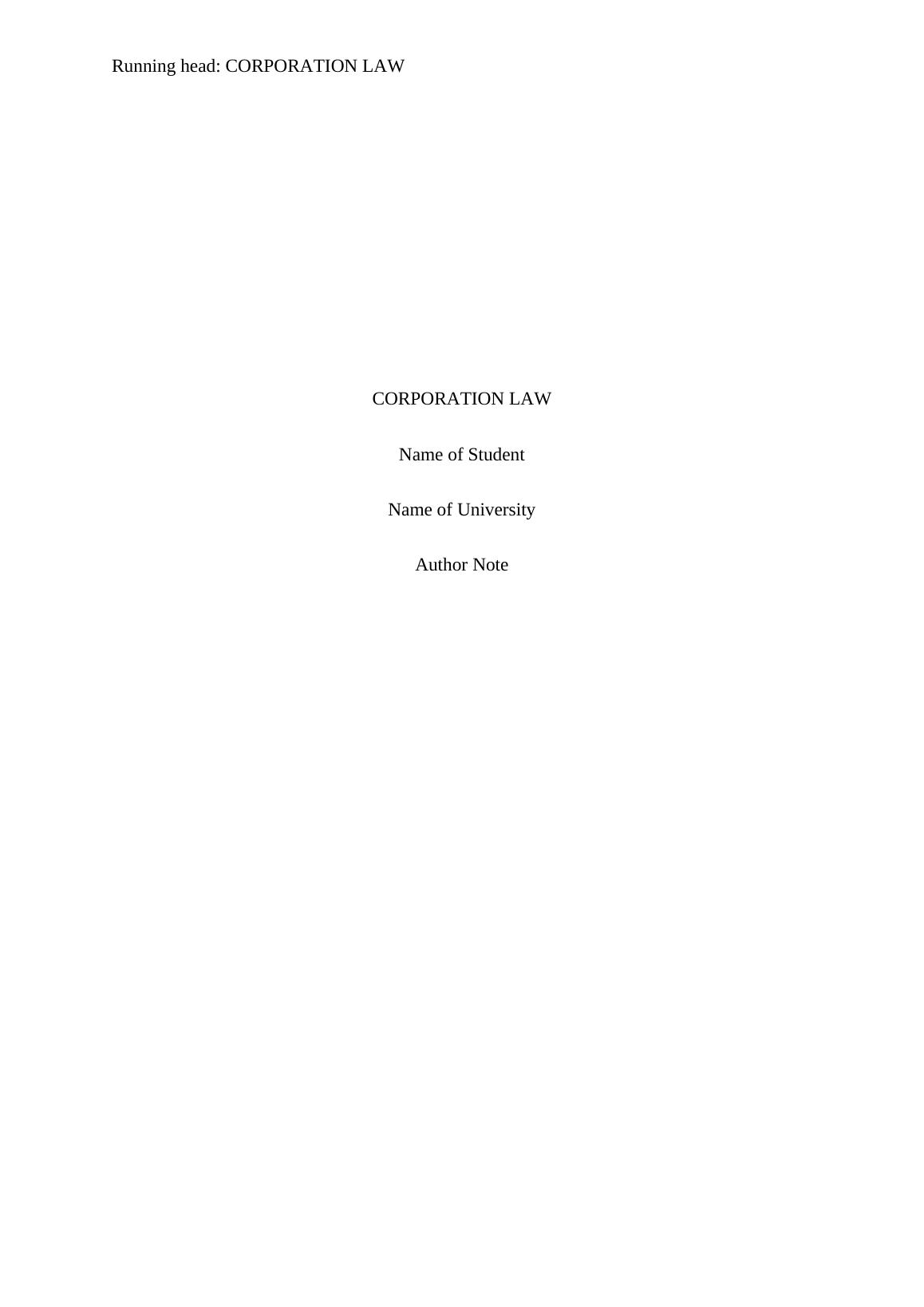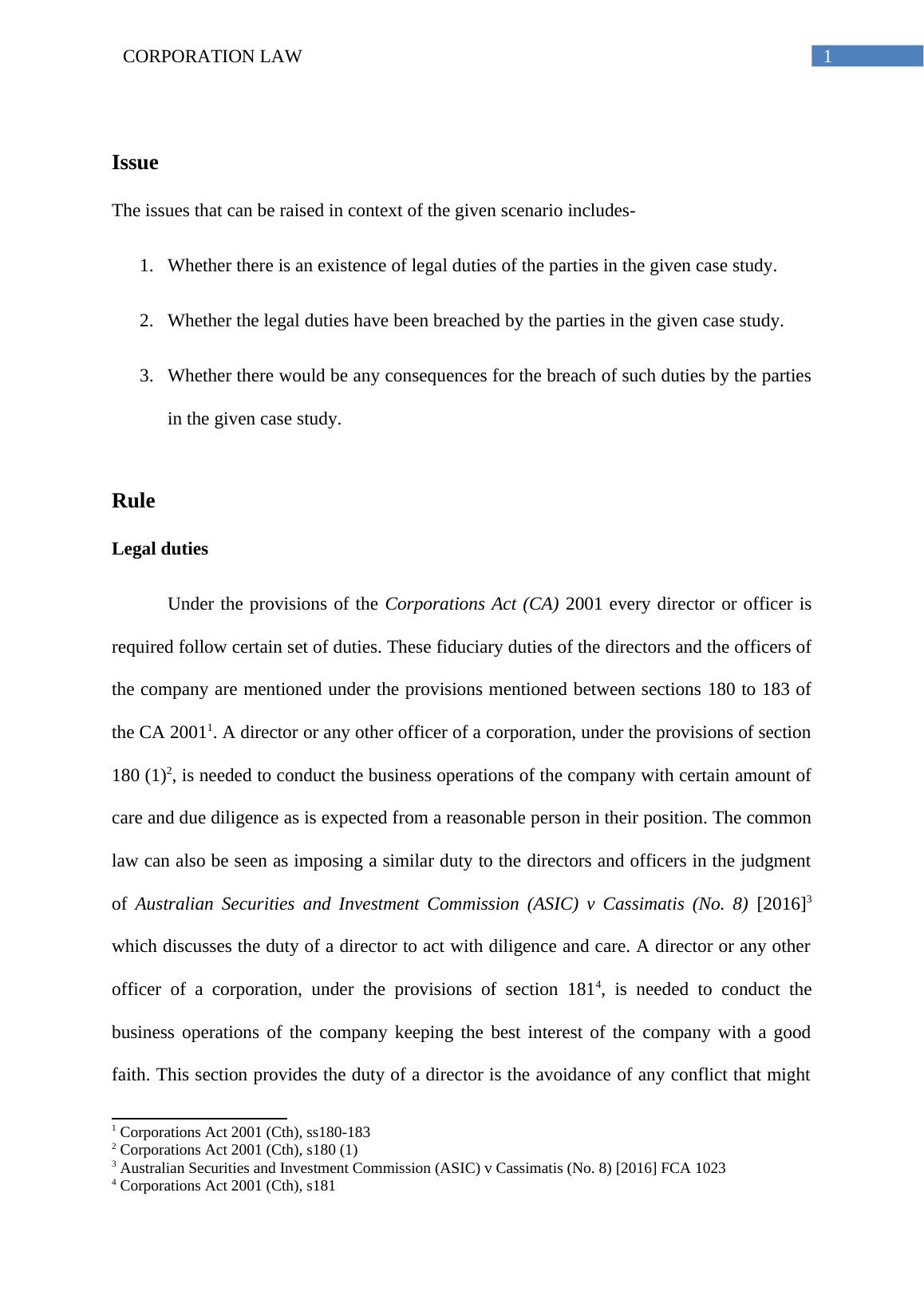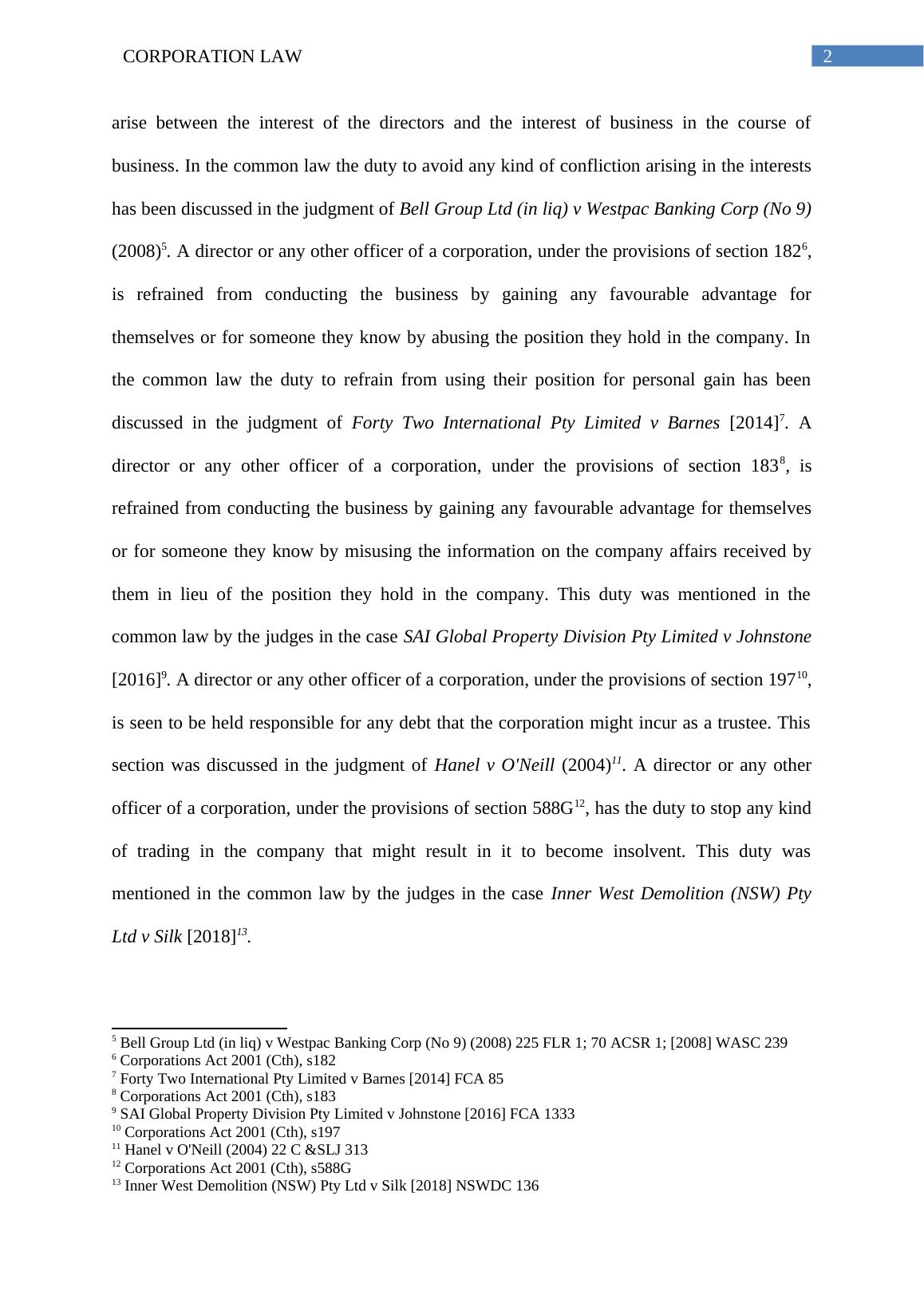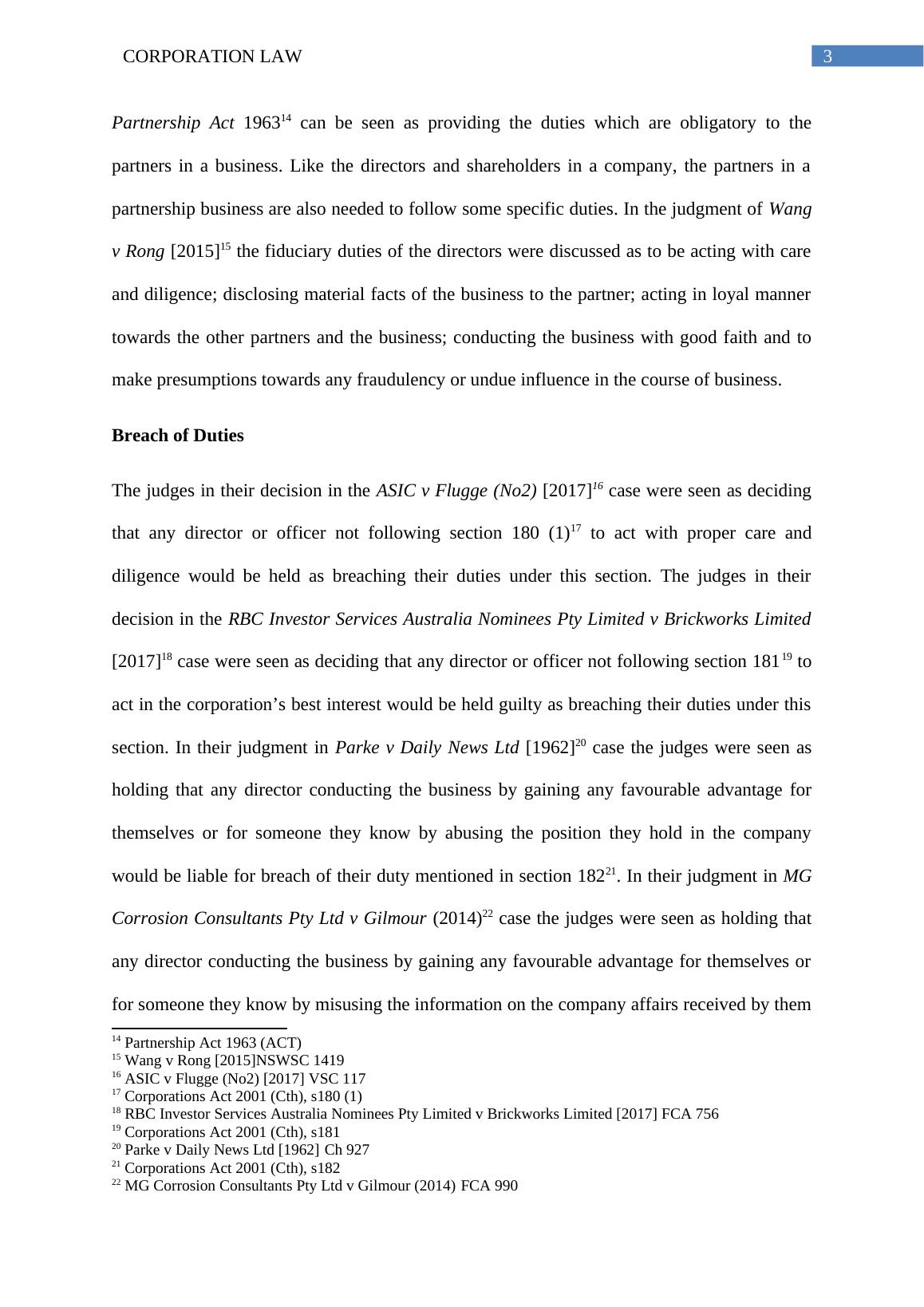What Is Corporate Law and Why Is It Important?
Prepare a report analyzing a hypothetical business case using key legal concepts and determining legal responsibilities, consequences, and steps to address them.
11 Pages2731 Words18 Views
Added on 2022-08-31
What Is Corporate Law and Why Is It Important?
Prepare a report analyzing a hypothetical business case using key legal concepts and determining legal responsibilities, consequences, and steps to address them.
Added on 2022-08-31
ShareRelated Documents
Running head: CORPORATION LAW
CORPORATION LAW
Name of Student
Name of University
Author Note
CORPORATION LAW
Name of Student
Name of University
Author Note

CORPORATION LAW1
Issue
The issues that can be raised in context of the given scenario includes-
1. Whether there is an existence of legal duties of the parties in the given case study.
2. Whether the legal duties have been breached by the parties in the given case study.
3. Whether there would be any consequences for the breach of such duties by the parties
in the given case study.
Rule
Legal duties
Under the provisions of the Corporations Act (CA) 2001 every director or officer is
required follow certain set of duties. These fiduciary duties of the directors and the officers of
the company are mentioned under the provisions mentioned between sections 180 to 183 of
the CA 20011. A director or any other officer of a corporation, under the provisions of section
180 (1)2, is needed to conduct the business operations of the company with certain amount of
care and due diligence as is expected from a reasonable person in their position. The common
law can also be seen as imposing a similar duty to the directors and officers in the judgment
of Australian Securities and Investment Commission (ASIC) v Cassimatis (No. 8) [2016]3
which discusses the duty of a director to act with diligence and care. A director or any other
officer of a corporation, under the provisions of section 1814, is needed to conduct the
business operations of the company keeping the best interest of the company with a good
faith. This section provides the duty of a director is the avoidance of any conflict that might
1 Corporations Act 2001 (Cth), ss180-183
2 Corporations Act 2001 (Cth), s180 (1)
3 Australian Securities and Investment Commission (ASIC) v Cassimatis (No. 8) [2016] FCA 1023
4 Corporations Act 2001 (Cth), s181
Issue
The issues that can be raised in context of the given scenario includes-
1. Whether there is an existence of legal duties of the parties in the given case study.
2. Whether the legal duties have been breached by the parties in the given case study.
3. Whether there would be any consequences for the breach of such duties by the parties
in the given case study.
Rule
Legal duties
Under the provisions of the Corporations Act (CA) 2001 every director or officer is
required follow certain set of duties. These fiduciary duties of the directors and the officers of
the company are mentioned under the provisions mentioned between sections 180 to 183 of
the CA 20011. A director or any other officer of a corporation, under the provisions of section
180 (1)2, is needed to conduct the business operations of the company with certain amount of
care and due diligence as is expected from a reasonable person in their position. The common
law can also be seen as imposing a similar duty to the directors and officers in the judgment
of Australian Securities and Investment Commission (ASIC) v Cassimatis (No. 8) [2016]3
which discusses the duty of a director to act with diligence and care. A director or any other
officer of a corporation, under the provisions of section 1814, is needed to conduct the
business operations of the company keeping the best interest of the company with a good
faith. This section provides the duty of a director is the avoidance of any conflict that might
1 Corporations Act 2001 (Cth), ss180-183
2 Corporations Act 2001 (Cth), s180 (1)
3 Australian Securities and Investment Commission (ASIC) v Cassimatis (No. 8) [2016] FCA 1023
4 Corporations Act 2001 (Cth), s181

CORPORATION LAW2
arise between the interest of the directors and the interest of business in the course of
business. In the common law the duty to avoid any kind of confliction arising in the interests
has been discussed in the judgment of Bell Group Ltd (in liq) v Westpac Banking Corp (No 9)
(2008)5. A director or any other officer of a corporation, under the provisions of section 1826,
is refrained from conducting the business by gaining any favourable advantage for
themselves or for someone they know by abusing the position they hold in the company. In
the common law the duty to refrain from using their position for personal gain has been
discussed in the judgment of Forty Two International Pty Limited v Barnes [2014]7. A
director or any other officer of a corporation, under the provisions of section 1838, is
refrained from conducting the business by gaining any favourable advantage for themselves
or for someone they know by misusing the information on the company affairs received by
them in lieu of the position they hold in the company. This duty was mentioned in the
common law by the judges in the case SAI Global Property Division Pty Limited v Johnstone
[2016]9. A director or any other officer of a corporation, under the provisions of section 19710,
is seen to be held responsible for any debt that the corporation might incur as a trustee. This
section was discussed in the judgment of Hanel v O'Neill (2004)11. A director or any other
officer of a corporation, under the provisions of section 588G12, has the duty to stop any kind
of trading in the company that might result in it to become insolvent. This duty was
mentioned in the common law by the judges in the case Inner West Demolition (NSW) Pty
Ltd v Silk [2018]13.
5 Bell Group Ltd (in liq) v Westpac Banking Corp (No 9) (2008) 225 FLR 1; 70 ACSR 1; [2008] WASC 239
6 Corporations Act 2001 (Cth), s182
7 Forty Two International Pty Limited v Barnes [2014] FCA 85
8 Corporations Act 2001 (Cth), s183
9 SAI Global Property Division Pty Limited v Johnstone [2016] FCA 1333
10 Corporations Act 2001 (Cth), s197
11 Hanel v O'Neill (2004) 22 C &SLJ 313
12 Corporations Act 2001 (Cth), s588G
13 Inner West Demolition (NSW) Pty Ltd v Silk [2018] NSWDC 136
arise between the interest of the directors and the interest of business in the course of
business. In the common law the duty to avoid any kind of confliction arising in the interests
has been discussed in the judgment of Bell Group Ltd (in liq) v Westpac Banking Corp (No 9)
(2008)5. A director or any other officer of a corporation, under the provisions of section 1826,
is refrained from conducting the business by gaining any favourable advantage for
themselves or for someone they know by abusing the position they hold in the company. In
the common law the duty to refrain from using their position for personal gain has been
discussed in the judgment of Forty Two International Pty Limited v Barnes [2014]7. A
director or any other officer of a corporation, under the provisions of section 1838, is
refrained from conducting the business by gaining any favourable advantage for themselves
or for someone they know by misusing the information on the company affairs received by
them in lieu of the position they hold in the company. This duty was mentioned in the
common law by the judges in the case SAI Global Property Division Pty Limited v Johnstone
[2016]9. A director or any other officer of a corporation, under the provisions of section 19710,
is seen to be held responsible for any debt that the corporation might incur as a trustee. This
section was discussed in the judgment of Hanel v O'Neill (2004)11. A director or any other
officer of a corporation, under the provisions of section 588G12, has the duty to stop any kind
of trading in the company that might result in it to become insolvent. This duty was
mentioned in the common law by the judges in the case Inner West Demolition (NSW) Pty
Ltd v Silk [2018]13.
5 Bell Group Ltd (in liq) v Westpac Banking Corp (No 9) (2008) 225 FLR 1; 70 ACSR 1; [2008] WASC 239
6 Corporations Act 2001 (Cth), s182
7 Forty Two International Pty Limited v Barnes [2014] FCA 85
8 Corporations Act 2001 (Cth), s183
9 SAI Global Property Division Pty Limited v Johnstone [2016] FCA 1333
10 Corporations Act 2001 (Cth), s197
11 Hanel v O'Neill (2004) 22 C &SLJ 313
12 Corporations Act 2001 (Cth), s588G
13 Inner West Demolition (NSW) Pty Ltd v Silk [2018] NSWDC 136

CORPORATION LAW3
Partnership Act 196314 can be seen as providing the duties which are obligatory to the
partners in a business. Like the directors and shareholders in a company, the partners in a
partnership business are also needed to follow some specific duties. In the judgment of Wang
v Rong [2015]15 the fiduciary duties of the directors were discussed as to be acting with care
and diligence; disclosing material facts of the business to the partner; acting in loyal manner
towards the other partners and the business; conducting the business with good faith and to
make presumptions towards any fraudulency or undue influence in the course of business.
Breach of Duties
The judges in their decision in the ASIC v Flugge (No2) [2017]16 case were seen as deciding
that any director or officer not following section 180 (1)17 to act with proper care and
diligence would be held as breaching their duties under this section. The judges in their
decision in the RBC Investor Services Australia Nominees Pty Limited v Brickworks Limited
[2017]18 case were seen as deciding that any director or officer not following section 18119 to
act in the corporation’s best interest would be held guilty as breaching their duties under this
section. In their judgment in Parke v Daily News Ltd [1962]20 case the judges were seen as
holding that any director conducting the business by gaining any favourable advantage for
themselves or for someone they know by abusing the position they hold in the company
would be liable for breach of their duty mentioned in section 18221. In their judgment in MG
Corrosion Consultants Pty Ltd v Gilmour (2014)22 case the judges were seen as holding that
any director conducting the business by gaining any favourable advantage for themselves or
for someone they know by misusing the information on the company affairs received by them
14 Partnership Act 1963 (ACT)
15 Wang v Rong [2015]NSWSC 1419
16 ASIC v Flugge (No2) [2017] VSC 117
17 Corporations Act 2001 (Cth), s180 (1)
18 RBC Investor Services Australia Nominees Pty Limited v Brickworks Limited [2017] FCA 756
19 Corporations Act 2001 (Cth), s181
20 Parke v Daily News Ltd [1962] Ch 927
21 Corporations Act 2001 (Cth), s182
22 MG Corrosion Consultants Pty Ltd v Gilmour (2014) FCA 990
Partnership Act 196314 can be seen as providing the duties which are obligatory to the
partners in a business. Like the directors and shareholders in a company, the partners in a
partnership business are also needed to follow some specific duties. In the judgment of Wang
v Rong [2015]15 the fiduciary duties of the directors were discussed as to be acting with care
and diligence; disclosing material facts of the business to the partner; acting in loyal manner
towards the other partners and the business; conducting the business with good faith and to
make presumptions towards any fraudulency or undue influence in the course of business.
Breach of Duties
The judges in their decision in the ASIC v Flugge (No2) [2017]16 case were seen as deciding
that any director or officer not following section 180 (1)17 to act with proper care and
diligence would be held as breaching their duties under this section. The judges in their
decision in the RBC Investor Services Australia Nominees Pty Limited v Brickworks Limited
[2017]18 case were seen as deciding that any director or officer not following section 18119 to
act in the corporation’s best interest would be held guilty as breaching their duties under this
section. In their judgment in Parke v Daily News Ltd [1962]20 case the judges were seen as
holding that any director conducting the business by gaining any favourable advantage for
themselves or for someone they know by abusing the position they hold in the company
would be liable for breach of their duty mentioned in section 18221. In their judgment in MG
Corrosion Consultants Pty Ltd v Gilmour (2014)22 case the judges were seen as holding that
any director conducting the business by gaining any favourable advantage for themselves or
for someone they know by misusing the information on the company affairs received by them
14 Partnership Act 1963 (ACT)
15 Wang v Rong [2015]NSWSC 1419
16 ASIC v Flugge (No2) [2017] VSC 117
17 Corporations Act 2001 (Cth), s180 (1)
18 RBC Investor Services Australia Nominees Pty Limited v Brickworks Limited [2017] FCA 756
19 Corporations Act 2001 (Cth), s181
20 Parke v Daily News Ltd [1962] Ch 927
21 Corporations Act 2001 (Cth), s182
22 MG Corrosion Consultants Pty Ltd v Gilmour (2014) FCA 990

End of preview
Want to access all the pages? Upload your documents or become a member.
Related Documents
Corporations and Business Structureslg...
|11
|2715
|19
Company Law Assignment: Fiduciary Duty | Advice for the Clientslg...
|7
|1223
|23
Company Lawlg...
|7
|1779
|135
A BUSINESS LAW Issue. The present case of Bill and Samlg...
|7
|1259
|11
Liability of Drago as a Directorlg...
|11
|2630
|89
Breach of Director's Duties under Corporations Act 2001lg...
|9
|1964
|165
